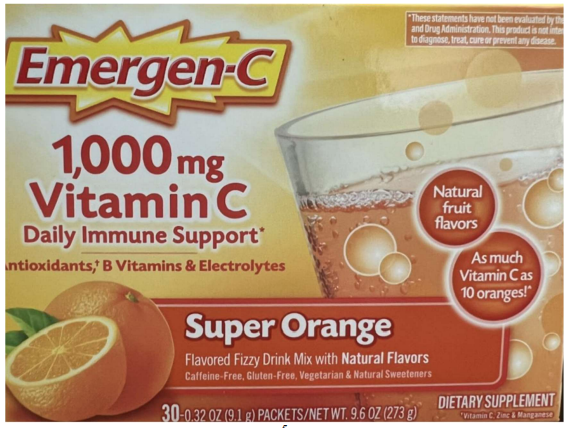Emergen-C Lawsuit Says Supplements Are Falsely Advertised With ‘Natural Fruit Flavors’ Claim
Wong et al. v. GlaxoSmithKline Consumer Healthcare Holdings (US) LLC
Filed: May 30, 2024 ◆§ 3:24-cv-00943
The maker of Emergen-C faces a class action lawsuit that alleges the supplements are misbranded as containing only natural flavorings.
California
The maker of Emergen-C faces a proposed class action lawsuit that alleges the dietary supplements are misbranded and falsely advertised as containing only natural flavorings.
Get class action lawsuit news sent to your inbox – sign up for ClassAction.org’s free weekly newsletter here.
The 22-page Emergen-C lawsuit against manufacturer Haleon says that although the supplements have a “clean label”—meaning promoted as containing “natural fruit flavors”—the drink mix powders, in truth, contain artificial malic acid, known as DL malic acid, which is “manufactured in petrochemical plants from benzene or butane.”
According to the complaint, the plaintiff’s counsel commissioned testing of the Emergen-C supplements by a reputable independent food testing and analysis lab, which found that the malic acid in the products was, in fact, the artificial version of the ingredient.
The filing mentions that the natural version of malic acid, derived from natural fruit sources such as apples, is “quite expensive” and generally cost-prohibitive for use on a mass scale in foods and beverages.
Per the case, the federal Food, Drug, and Cosmetic Act mandates that a food product’s label accurately describe the nature of the food and its characterizing flavors. If a food’s flavoring comes by way of an artificial substance used to reinforce a certain flavor profile, the product’s label must include a disclosure to consumers that the item is “artificially flavored,” the suit specifies.
“That is, whenever a food manufacturer uses malic acid to simulate or reinforce the characterizing flavor of a food or beverage, it is required under federal regulations to state that the food or beverage is ‘Artificially Flavored’ if the malic acid used to simulate or reinforce the characterizing flavor is DL malic acid,” the complaint summarizes.

Overall, the Emergen-C products at issue lack the required disclosures concerning the use of artificial flavoring, the case shares, adding that consumers relied on the products’ packaging statements when making buying decisions.
“Plaintiffs reasonably relied on these label statements such that they would not have purchased the Products from Defendant if the truth about the Products was known, or would have only been willing to pay a substantially reduced price for the Products had they known that Defendant’s representations regarding flavoring were false and misleading.”
The Emergen-C lawsuit looks to cover all consumers in California who bought Emergen-C dietary supplements—including the Raspberry, Super Orange, Tangerine, Cranberry Pomegranate, Pink Lemonade, Strawberry-Kiwi, and Tropical varieties—within the last four years.
Are you owed unclaimed settlement money? Check out our class action rebates page full of open class action settlements.
Video Game Addiction Lawsuits
If your child suffers from video game addiction — including Fortnite addiction or Roblox addiction — you may be able to take legal action. Gamers 18 to 22 may also qualify.
Learn more:Video Game Addiction Lawsuit
Depo-Provera Lawsuits
Anyone who received Depo-Provera or Depo-Provera SubQ injections and has been diagnosed with meningioma, a type of brain tumor, may be able to take legal action.
Read more: Depo-Provera Lawsuit
How Do I Join a Class Action Lawsuit?
Did you know there's usually nothing you need to do to join, sign up for, or add your name to new class action lawsuits when they're initially filed?
Read more here: How Do I Join a Class Action Lawsuit?
Stay Current
Sign Up For
Our Newsletter
New cases and investigations, settlement deadlines, and news straight to your inbox.
Before commenting, please review our comment policy.